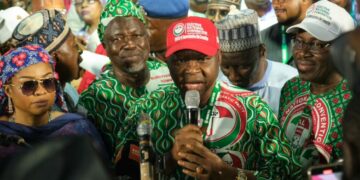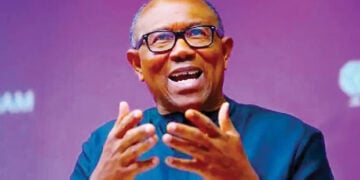In a surprising turn of events, the All Progressives Congress (APC) National Working Committee (NWC) is reevaluating its zoning arrangement for the leadership positions in the 10th National Assembly.
APC had on Monday officially announced the endorsement of Akpabio (South South) as president of the 10th and Abbas (North West) as Speaker of the incoming 10th Assembly.
The party also named Tajudeen Abbas, from Kaduna State (North West) as Speaker of the House and Benjamin Kalu from Abia State (South East) as deputy Speaker.
Announcing the zoning formula, a statement issued by national publicity secretary of the party, Barr Felix Morka, after the NWC meeting noted: “The National Working Committee of the All Progressives Congress (APC) met today, Monday, May 8, 2023 to consider reports of consultations and meetings held with the President- Elect, His Excellency, Asiwaju Bola Ahmed Tinubu, other Party leaders and stakeholders on zoning arrangement for 10th National Assembly leadership positions.
The NWC noted with respect the outcome of the meetings held between the President-Elect and the leadership of the NWC. The NWC called for further and better consultation with necessary stakeholders in order to assure the support of the aspirants to the National Assembly leadership positions and members of the Party nationwide.
“The zoning arrangement reported to the NWC is as follows: Senate: Senate President – South South Senator Godswill Akpabio (Akwa Ibom). Deputy Senate President – North West- Senator Barau Jubrin (Kano).
House of representative: Speaker. North West – Hon. Abass Tajudeen (Kaduna); Deputy Speaker South East-Hon. Ben Kalu (Abia).
“We urge our party leaders, members and all Nigerians to continue to work for peace and progress of our country during and beyond the current period of leadership transition.”
Miffed by the development, the Senate president aspirants on Thursday confronted the party leadership over the choice of Akpabio, vowing to call the party’s bluff on the floor of the Red Chamber on inauguration day.
Apparently unsettled by the growing protests against the arrangement, national chairman of the party, Sen Abdullahi Adamu, told aspirants for the Senate presidency race who stormed the party’s national secretariat in protest that the party would go back to the drawing board and review the zoning formula.
Bowing to pressure, Adamu admitted that the zoning list is flawed because it was drafted without adequate consultations.
Similarly, there are also protest against the candidacy for the speakership position. The decision comes in the wake of controversy and outrage surrounding the candidature of Abass, as some lawmakers alleged that a group of lawmakers from Lagos took it upon themselves to sell his candidacy forcefully.
The Lagos lawmakers, believed to be supporters of Abass, allegedly approached the president-elect with a claim that he had been adopted as the consensus candidate of the House of Representatives (HOR) Caucus. Leveraging this information, they convinced the influential party leader, Bola Tinubu, to endorse Abass and another candidate, Kalu, for the position of Speaker.
Tinubu subsequently sent their names to the party, asserting that they were the chosen candidates of the APC lawmakers.
For now incumbent deputy Speaker, Ahmed Idris Wase; House leader, Alhassan Ado Doguwa; Chairman, House Committee on Appropriation, Aliyu Betara,chairman, House committee on Navy, Yussuf Gagdi; former chairman of the House of Representatives committee on National Security and intelligence in the 8th Assembly, Aminu Sani Jaji, Chairman, House of Committee on Disabilities and Special Needs, Princess Mariam Onuoha, House Committee on Water Resources, Sada Soli have all indicated their interest in contesting the speaker position in the 10th National Assembly.
However, the announcement of Abass and Kalu as the party’s candidates triggered an unexpected reaction. Seven other aspirants, who were vying for the position, protested that they were never consulted regarding the zoning arrangement.
This lack of consultation and the general outrage that followed came as a shock to the party leadership, prompting the APC chairman to acknowledge that they “did not consult enough.”
As the selection process unfolds, the promoters of Abass have resorted to employing other tactics to secure support for their favored candidate.
Reports suggest that threats have been made against members-elect who refuse to back down. More than 200 of the incoming lawmakers are fresh faces who do not owe allegiance to the present House leadership, making them less susceptible to pressure.
Similarly, a notice was sent to members-elect, inviting them to a meeting with the vice president-elect, Kashim Shettima. However, upon further investigation, it was revealed that the meeting was not about Shettima endorsing the candidtature of Abbas .
In response, the G7 lawmakers issued a statement earlier warning their colleagues not to fall for this ruse.
The entire saga has prompted the APC National Working Committee to reassess the zoning arrangement and the manner in which candidates are selected for key positions.
According to political analysts, the lack of proper consultation and the coercive tactics employed by certain individuals have tarnished the party’s reputation and undermined the democratic process within the party.
The controversy surrounding the selection of the Speaker of the 10th Assembly highlights the need for transparency, inclusivity, and adherence to party principles.
The thinking is that it is essential that all aspirants are given a fair chance to compete and that the decision-making process is free from undue influence or coercion.
As the APC NWC engages in internal deliberations to address the situation, party members and the public at large will be eagerly watching to see how the matter unfolds. The future of the 10th Assembly, and indeed the credibility of the APC, hinges on the ability to rectify the flaws that have marred this selection process.
Ultimately, it is crucial that the APC reasserts its commitment to democratic principles, ensuring that the voices of all members-elect are heard and respected. The party must work towards unity, fairness, and the preservation of its core values to rebuild public trust and strengthen its position as a leading political force in Nigeria.





